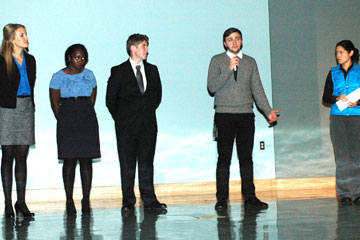
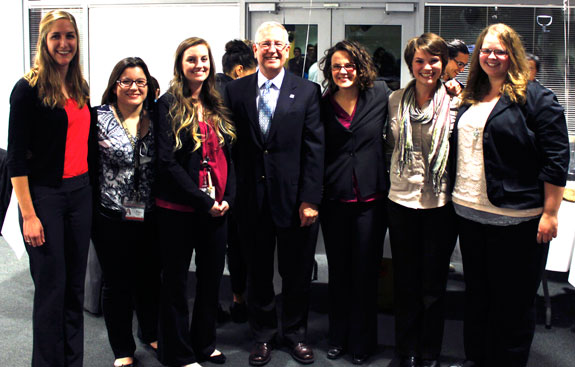 David Goff, center, dean of the Colorado School of Public Health, stands with the winning team of the Rocky Mountain Region Public Health Case Competition. The team devised a program called "Amped" to spread awareness about the dangers of marijuana among adolescents. Photo by Chris Harris.
David Goff, center, dean of the Colorado School of Public Health, stands with the winning team of the Rocky Mountain Region Public Health Case Competition. The team devised a program called "Amped" to spread awareness about the dangers of marijuana among adolescents. Photo by Chris Harris.
By Chris Casey | University Communications
AURORA, Colo.—Colorado, it's time to get amped.
With that opening statement, a team of six students representing multiple health disciplines explained how their "Amped" program would reduce marijuana use among adolescents. Their multi-layered proposal was selected the winner of the second annual Rocky Mountain Region Public Health Case Competition.
Each team was randomly formed from the pool of participants and given just 24 hours to formulate a solution to a public health problem. For their quick thinking and innovation, the "Amped" team receives an all-expense-paid trip to Emory University in Atlanta for the Global Public Health Case Competition next spring. Each team member also receives a $750 scholarship.
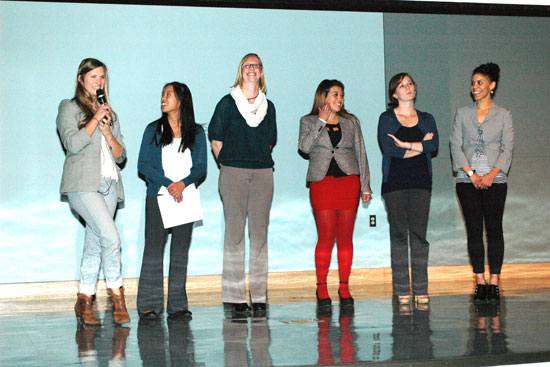
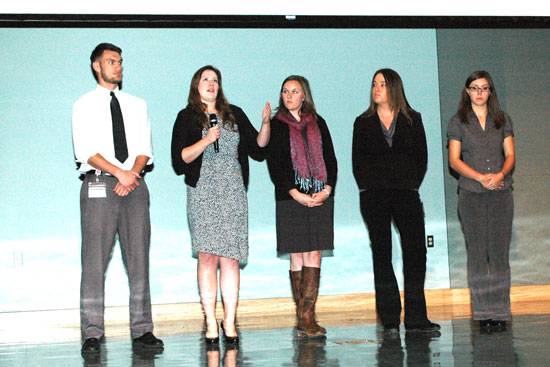
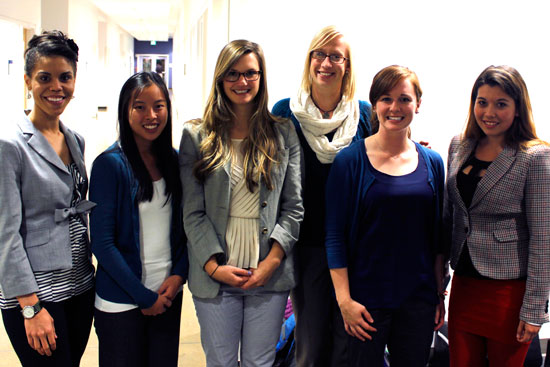
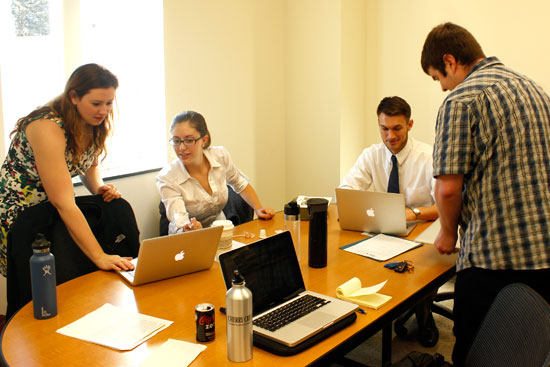
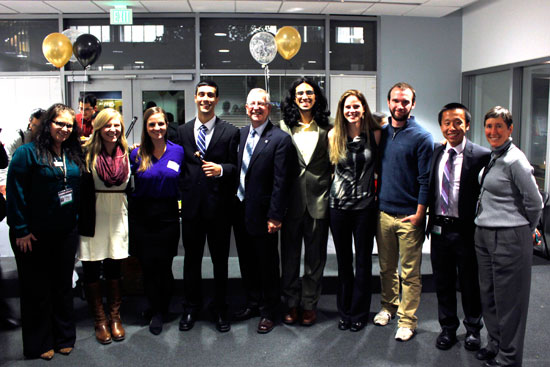
The competition took place last weekend, involving more than 90 undergraduate and graduate students separated into 16 teams. All schools and colleges at CU Anschutz were represented, including students in the Colorado School of Public Health (ColoradoSPH). Four teams advanced as finalists out of Saturday's preliminary round; they presented their proposals to a six-member panel of judges on Monday in Education 2 South.
The students were tasked with developing a program, policy or research study to address this problem: Determine the best strategy for reducing the health and socioeconomic consequences of marijuana exposure in the state's pediatric and adolescent populations. They devised strategies as if they were applying for a three-year, $3 million grant.
The team of Emily Berry, Meagan Cain, Laura Fischer, Chevaun Hammer, Sally Peach and Maria Ulloa devised "Amped" to be a program that empowers troubled youth to become effective educators of their peers. Peach said Colorado currently has an estimated 50,000 adolescent marijuana users, "and this comes at a time when it's been shown to be detrimental to their health," as well as rates of high school and college graduation.
The goals of their program are three-fold, she said:
- Decrease marijuana use among Colorado youth;
- Increase knowledge of perceived risks associated with adolescent marijuana use; and
- Change social behaviors around marijuana's use.
The program would include an advisory board, a social media presence—a smartphone app the team dubbed "Weed Whacker"—and peer educators. "If we want to change behavior, we have to approach it from many directions," Peach said.
The teams formulated websites and apps as ways to reach wide populations with educational messaging and intervention campaigns. One team proposed a device, the Pot Box, which safely locks edible marijuana products away from prying young hands. Some team proposals included survey campaigns as ways to gather data about behaviors as well as incentives to increase participation among teens and parents. The other two finalists titled their programs "#ClearStateofMind"—a social media-based proposal—and "Not Your Kids' Cookie."
All of the teams showed data that reflects growing use of marijuana, including increasing hospital visits for young children who've ingested edibles, in Colorado.
"The topic is timely but I think it was difficult because (marijuana legalization) is so new there wasn't much data or precedent from which to work," said Julie Rodriguez, on the "Project Pot Box" team. "It's been a great opportunity to learn how to collaborate quickly with people of different backgrounds and formulate a solution under a time crunch."
Rodriguez is a graduate student at CU Anschutz working toward her MS in epidemiology. One of her teammates, Sara Schievelbein is likewise a second-year graduate student at CU Anschutz. She's working toward a Masters in Public Health and Community and Behavioral Health.
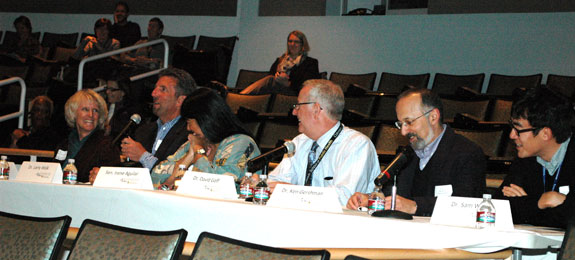 Judges for the finalist contest were, from left, Beth McCann, Larry Wolk, Irene Aguilar, David Goff, Ken Gershman and Sam Wang. Photo by Chris Casey.
Judges for the finalist contest were, from left, Beth McCann, Larry Wolk, Irene Aguilar, David Goff, Ken Gershman and Sam Wang. Photo by Chris Casey.
Schievelbein called the case competition an "eye-opening experience." "In our group, everyone brought something to the table," she said. "It wasn't just one person or two individuals. I don't think we would have made it to this round had we all not had our individual strengths."
Judges asked questions of each group after their presentations. The panel included David Goff, MD, PhD, dean of the Colorado SPH; Larry Wolk, MD, MSPH, executive director and chief medical officer of the Colorado Department of Public Health and Environment (CDPHE); Sam Wang, MD; Ken Gershman, MD, MPH, manager of the CDPHE's Medical Marijuana Research grant program; and two state legislators—Sen. Irene Aguilar, MD, and Rep. Beth McCann.
"I'm very impressed," Goff said to the finalists after their presentations. "I'm not surprised that students on this campus and across the campuses are so strong and so creative. I think these are ideas that folks in the Legislature and health department will be thinking about in the next few weeks and months. I would say that, with a very 'clear state of mind,' I'm really 'amped' about getting my 'not your kids' cookie' and putting them in my 'pot box.'"
McCann said all of the finalists offered clear goals and specific ways to achieve their objectives. "I thought they were all excellent."
Wolk said the teams all showed a great ability to think on their feet when asked challenging questions by the panel.
"There are jobs (out there) for all of you," he said, generating appreciative applause and smiles from the assembled teams.
How the other three finalist teams placed:
Second Place ($500 scholarship each)
'Project Pot Box'
Nicholas Cogdall
Julie Rodriguez
Sarah Schievelbein
Blaine Wajdowicz
Eula Way
Third Place ($350 scholarship each)
Not Your Kids' Cookie
Stephen Asay
Kelly Burka
Jane Kuhlwilm
Alicia Morris
Shea Swickle
Natalie Thomas
Fourth Place ($250 scholarship each)
#ClearStateOfMind
Cindy Ha
Mckenzie Rieder
Amber Sobczak
Adrienne Wall
Crystal Hulin
Mayra Gallegos
Community Choice Winner ($100 scholarship each)
MaLaura Creager
Lesly Feaux
Stephanie Goris
Kathryn Griffith
Michael Harper
Randi Johnson
Published: Nov. 12, 2014
Contact:christopher.casey@ucdenver.edu
